#eu migrant funds
Text
Brussels has sent Turkey billions of euros to provide for migrants and refugees who would otherwise cross into the EU. But it's not clear how the money is being spent.
European Union auditors said on Wednesday that they are unable to establish whether some of the billions of euros the bloc has given to Turkey to help it cope with Syrian refugees is actually having any impact.
Under a deal concluded between EU leaders and Turkey in 2016, the bloc committed to provide at least €6 billion to Turkey to help it cope with migrants crossing in from Syria. Turkey in turn committed to stop migrants leaving its territory for Europe.
In March 2016, a month after the deal came into effect, Turkey's government said the number of migrants crossing illegally into Greece had dropped from around 6,000 per day in November 2015 to about 130 daily.
In 2021, the leaders announced plans to send a further €3 billion for refugees in Turkey. The pact, which was hailed in Europe as a great success, served as a template for other more recent and elaborate deals with Tunisia and Egypt.
Money from the agreement is used to supply cash cards to some of the more than 4 million registered refugees in Turkey, as well as to improve education and health, to help people to better integrate into society and to build facilities that people fleeing the war in Syria might need.
But the European Court of Auditors, or ECA, in a follow-up last year on whether the money was being used effectively, said that Turkey's education ministry had refused to provide information that might allow them to assess what impact EU projects are having.
continue reading

I can't understand why Greece and Türkiye are always at each other's throats when they have so much in common, in this case how EU funds intended for one purpose are used for another. Türkiye, however, has the EU over a barrel, a position achieved by skirting your responsibility and outsourcing your perceived problem.
#eu#türkiye#eu migrant funds#no insight in use#misuse of eu funds#fortress europe#immigration and asylum
1 note
·
View note
Text
There are several NGO-funded ships currently operating in the central Mediterranean Sea with the specific intent of saving migrants from what has been for years one of the deadliest migration routes in the world. Here is partial list:
Geo Barents (Médecins Sans Frontières)
Ocean Viking (SOS Méditerranée)
Aurora, Sea Watch 3 and Sea Watch 5 (Sea Watch)
Life Support (Emergency)
Open Arms and other ships (Open Arms)
Another important resource for migrants in distress at sea is the hotline AlarmPhone.
Since 2016 these rescue missions have become more and more onerous to fund as EU countries have progressively strengthened the Frontex program while at the same time criminalizing NGO-led search and rescue operations. (Italy has been at the forefront of this trend, and a shipwreck on the coast of Calabria in late February this year only managed to strengthen the resolve of the current government to make it even more complex for NGOs to try and rescue migrants.) So while it definitely won't solve the root issue, donating to these NGOs still has a tangible effect.
#only a partial list & please let me know if there are better sources or links are broken#apologies for the version circulating having spelling mistakes#'ong' is the Italian spelling for non-governmental organization
7K notes
·
View notes
Note
Hi! Do you think you could link me to some resources about the problems/ evils of the EU? Would love to find some but it's hard to know what's reliable when I have no base knowledge in this area + you seem very well informed :)
sure. let's start with what the EU does to its own member states--in 2009, the EU bailed the greek government out of severe debt on the condition that they establish brutal austerity measures, cutting public spending and welfare. these measures served to immiserate and destroy the lives of thousands of greek people:
Greek mortality has worsened significantly since the beginning of the century. In 2000, the death rate per 100,000 people was 944.5. By 2016, it had risen to 1174.9, with most of the increase taking place from 2010 onwards.
[forbes]
Since the implementation of the austerity programme, Greece has reduced its ratio of health-care expenditure to GDP to one of the lowest within the EU, with 50% less public hospital funding in 2015 than in 2009. This reduction has left hospitals with a deficit in basic supplies, while consumers are challenged by transient drug shortages.
[the lancet]
The homeless population is thought to have grown by 25 per cent since 2009, now numbering 20,000 people.
[oxfam]
the most brutal treatment, however, the EU of course reserves for migrants from the global south. the EU sets strict migration quotas and uses its member states as weapons against desperate people fleeing across the mediterranean. boats are prevented from landing, migrants that do make it to land are repelled with brutal violence, and refugees are deported back to countries where their lives are in lethal danger. these policies have led to many, many deaths--and the refugees and migrants who do survive are treating fucking inhumanely.
After a perilous journey across the desert, Abdulaziz was locked up in Triq al-Sikka, a grim prison in Tripoli, Libya. Why? Because the EU pays Libyan militias millions of euros to detain anyone deemed a possible migrant to Europe [...] A leaked EU internal memorandum in 2020 acknowledged that capturing migrants was now “a profitable business model” [...] in Triq al-Sikka and other detention centres, “acts of murder, enslavement, torture, rape and other inhumane acts are committed against migrants”, observed a damning UN report.
[the guardian]
Volunteers have logged more than 27,000 deaths by drowning since 1993, often hundreds at a time when large ships capsize. These account for nearly 80% of all the entries.
[the guardian]
Refugees and asylum seekers were punched, slapped, beaten with truncheons, weapons, sticks or branches, by police or border guards who often removed their ID tags or badges, the committee said in its annual report. People on the move were subject to pushbacks, expulsion from European states, either by land or sea, without having asylum claims heard.
Victims were also subject to “inhuman and degrading treatment”, such as having bullets fired close to their bodies while they lay on the ground, being pushed into rivers, sometimes with hands tied, or being forced to walk barefoot or even naked across a border.
[the guardian]
In September, Greece opened a refugee camp on the island of Samos that has been described as prison-like. The €38m (£32m) facility for 3,000 asylum seekers has military-grade fencing and CCTV to track people’s movements. Access is controlled by fingerprint, turnstiles and X-rays. A private security company and 50 uniformed officers monitor the camp. It is the first of five that Greece has planned; two more opened in November.
[the guardian]
i could go on. i could cite dozens more similarly brutal news stories about horrific mistreatment, or any of the dozens of people who have killed themselves in the custody of border police under horrific conditions. the EU is a murderous institution that does not care about the lives of refugees and migrants or about the lives of the citizens of any member state that is not pursuing a vicious enough neoliberal political program
1K notes
·
View notes
Text
With a budget nearing $1 billion, Frontex is the EU’s best-funded government agency. [...] including by helping Libya’s EU-funded coast guard send hundreds of thousands of migrants back to be detained in Libya under conditions that amounted to torture and sexual slavery. In 2022, the agency’s director, Fabrice Leggeri, was forced out over a mountain of scandals, including covering up similar “pushback” deportations, which force migrants back across the border before they can apply for asylum.
[...] EU hopes to extend Frontex’s reach far beyond its territory, into sovereign African nations Europe once colonized, with no oversight mechanisms to safeguard against abuse. Initially, the EU even proposed granting immunity from prosecution to Frontex staff in West Africa. [...] 26 African countries have received taxpayer euros aimed at curbing migration through more than 400 discrete projects. Between 2015 and 2021, the EU invested $5.5 billion in such projects, with more than 80% of the funds coming from developmental and humanitarian aid coffers.
[...] Besides the surveillance tech the DNLT branches receive, migration data analysis systems have also been installed at each post, along with biometric fingerprinting and facial recognition systems. The stated aim is to create what eurocrats call an African IBM system: Integrated Border Management. [...] no European countries maintain databases with this level of biometric information.
[...] In Niger, for instance, the EU helped draft a law that criminalized virtually all movement in the north of the country, effectively making regional mobility illegal.
541 notes
·
View notes
Photo

If you didn’t know, the British Government is passing a new immigration bill which will allow them to immidiately deport migrants to Rwanda, regardless of their national origin or asylum seeker status. A broadcaster critcised this on his personal twitter and the BBC fired him. At the same time, the BBC also pulled an episode of a David Attenborough series off air for mentioning the poor state of the environment in the UK. BBC News also promotes hate and deception, baming NHS workers for the health services being stretched even though the problem is a lack of government funding. Blaming post-Brexit food shortages on “freak weather affecting transportation” even though no EU countries have food shortages. This country is rotten.
239 notes
·
View notes
Note
are you pro, or anti immigration for refugees? what do you think in regards to the immigration situation with sweden?
Well refugees aren’t emigrating so they can’t be counted in the category of immigration. Refugees have the legal right to claim asylum in any country, regardless of their immigration policies. Our right-wing media conflates the two groups (on purpose) but it’s very important that we don’t treat them as belonging to the same category.
I assume you’re talking about Sweden requiring non-EU labour migrants to have secured a monthly salary amounting to at least 80% of the gross median salary in Sweden to obtain a work permit. It will backfire, as similar policies always have across the EU. Labour migration is good for economies, this is a demonstrable fact that nobody seems to want to acknowledge anymore. Modern capitalism literally depends on underpaid migrant workers.
This is a policy informed by xenophobia rather than economics, and it’s sad to see Sweden going to same way we have in the UK. i would bet that it will be quietly watered down as soon as the relevant sectors (farming, manufacturing, care, medicine, service) feel the full effects. That’s exactly what happened in the UK less than a year after we implemented our own ‘hostile environment’ immigration policies.
In an ideal world (free from capitalism) the unfettered free movement of all peoples would be a human right, but if we’re talking purely national policy here and now then immigration of course needs to happen at a controlled rate to allow communities to adequately support, integrate and provide for their new members. That means a robust social welfare system, well-funded healthcare and education, and a true living wage. Of course, I support refugees as any reasonable person should.
22 notes
·
View notes
Text
For almost 15 years, the sight of Hungarian Prime Minister Viktor Orban strutting into leaders’ summits in Brussels has been a constant of European Union politics. Leveraging his authoritarian grip on power in Hungary, Orban has pressured the EU into providing subsidies to patronage networks controlled by his Fidesz Party, while leading a populist onslaught against liberalism and the left. But even as Orban attracts fawning admiration from other anti-liberal populists in Europe and the United States, cracks are beginning to show in his own power base in Hungary.
The recent surge of infighting within Fidesz’s political machine has taken many observers in and outside Hungary by surprise. After the party’s initial massive election victory in 2010, the collapse of rival parties that had mismanaged the economy and become engulfed in scandal when in government provided Orban’s inner circle with the opportunity to seize control of state media, the central bank and appointments to all levels of the judiciary. Having secured complete control of the state, Orban and his Fidesz cronies used repressive tactics by the security services as well as aggressive disinformation to divide the opposition and intimidate business leaders and civil society networks.
The regime’s near-complete dominance of Hungarian-language media has enabled Orban as well as the party’s regional bosses to use a blend of anti-migrant xenophobia and hostility to LGBTQ rights to sustain a strong base of support in small towns and rural communities. Orban has been more careful in recent years when it comes to fueling irredentist hostility against Romania, Ukraine and Slovakia over territory lost to neighboring states after Hungary’s defeat in World War I. But the Fidesz machine still tries to present Orban as a protector of Hungarian minorities abroad to its right-wing domestic audience.
In part because of the divide and rule tactics used by Fidesz since the early 2010s, but also because they lack deep historical traditions and resilient structures, the Hungarian opposition has been paralyzed by squabbling among parties and movements as hostile to one another as they are to Fidesz. More recent efforts to construct a united front in the face of Orban’s authoritarianism have struggled to sustain the cohesion needed to keep supporters mobilized in the face of mounting state pressure.
Yet state capture, disinformation and virulent nationalism alone would not have been enough to enable the Fidesz machine to secure Orban’s lasting dominance. With Hungary’s accession to the EU in 2004, whoever was in power in the late 2000s was going to be able to take credit for the impact that huge flows of funding from Brussels had on infrastructure development and economic growth in the aftermath of the great financial crisis. For all the fierce populist rhetoric Orban directs against Brussels to court Trumpian nationalists in the U.S. and the far right in Europe, the extent to which Fidesz relies on the distribution of EU funds to sustain its dominance within Hungary has kept Orban from being too disruptive when it comes to European integration.
Though the European Commission’s concerns over the erosion of rule of law in Hungary remain a severe point of friction, Orban’s willingness to avoid escalation over other contentious issues—such as aid for Ukraine or environmental regulation—has made it difficult for the Hungarian opposition to take advantage of the tensions he has stoked with Brussels. The fact that Orban’s patronage network now reaches deep into the Hungarian banking sector and national oil company has also provided Fidesz with options beyond EU subsidies with which to shape economic conditions ahead of elections. In the face of Fidesz’s overwhelming strength and willingness to use security services to intimidate opponents, the inability of opposition parties to make any significant gains during the 2022 parliamentary elections seemed to bury any hopes of change in Hungary for the foreseeable future.
Yet even as Orban successfully cultivated enthusiasm for his project among the populist right in the U.S. and EU, tensions were building up within his own power structure that could prove a much greater threat to the survival of the Fidesz political machine than a cowed Hungarian opposition. After such a long record of dominance, many senior figures loyal to Orban had become complacent over the impact a wave of political scandals might have on the Hungarian public at a time when inflation and other economic pressures were generating frustration even among Fidesz’s core supporters.
With the shock resignation in early February of President Katalin Novak and former Justice Minister Judit Varga over efforts within the government to cover up a child abuse scandal, tensions within Orban’s power structure have now burst into the open. In response, Peter Magyar—a senior figure within the Orban regime as well as Varga’s ex-husband—resigned from his positions at state-owned enterprises and founded a new political movement with the aim of dismantling a corrupt status quo. By early April, Magyar’s new opposition Tizsa Party was leading mass protests in Budapest and rapidly preparing a nationwide network designed to peel off elected officials and voters among Orban’s political base in smalltown Hungary.
The sudden defection of a figure like Magyar, who had long worked at the heart of the Fidesz political machine, is not just the result of a sudden discovery of moral scruples. As with many similar semi- or fully authoritarian regimes, the longer Orban has remained in office, the more entrenched various figures within his inner circle have become at the highest levels of power. For ambitious mid-40s careerists like Magyar, the grim prospect of waiting another decade for Orban’s inner circle—all 60-70 years old—to finally leave the scene was already fueling impatient frustration even before the current wave of scandals engulfed Fidesz.
Orban’s channeling of tens of millions of euros into populist think tanks and conferences designed to impress self-declared national conservatives in the U.S. and U.K. also generated the image of a leader so engaged in the Anglosphere’s culture wars that he had become detached from the everyday concerns of Hungarian politics. For an insider like Magyar, fed up with both waiting for a turn at the top and Orban’s obsession with his world historical role, the time seemed ripe to break away and establish a new political machine.
Deploying messaging and mobilization techniques eerily similar to those used by Orban’s team before it took power in 2010, Magyar has tried to knit together an electoral coalition made up of liberal-leaning voters who had always opposed the current government and a large swathe of Fidesz voters tired of the rampant cronyism at the heart of Orban’s patronage networks. But while Fidesz defectors like Magyar may eventually help to restore the rule of law and work more constructively in EU institutions, they are also likely to continue embracing the populist themes that propelled Orban to power. Moreover, in working to entice Fidesz regional bosses to switch allegiance to his new movement, Magyar will likely replicate the clientelist structures Orban has used to secure the loyalty of smalltown elites through the distribution of state and EU funds.
Magyar is also now the target of a full onslaught of attacks from media loyal to Orban, so there is no guarantee he can capitalize on his rise to prominence to make significant electoral gains in upcoming European Parliament and local elections, which his movement needs to survive. To prevent the fracturing of his own power base, Orban may also do his utmost to offer financial incentives and senior positions to bring Magyar and other defectors back into the Fidesz political machine. Though Magyar’s ambitions will remain focused on replacing Orban as prime minister, business networks worried about instability that a clash between the two might bring will also try to broker a negotiated transfer of power that avoids any deeper reforms.
Even if Magyar falters, the speed with which Fidesz’s internal tensions have turned into an external challenge to its political machine is an indication of how brittle Orban’s grip on power has become. Even the most dominant authoritarian leader will always face dilemmas when it comes to rewarding ambitious young talent without alienating older cronies whose loyalty is the glue that holds a clientelist system together. If Orban is eventually toppled, it should surprise no one if the figures who were once closest to him turn out to be the ruthless operators that finally take him down.
14 notes
·
View notes
Text

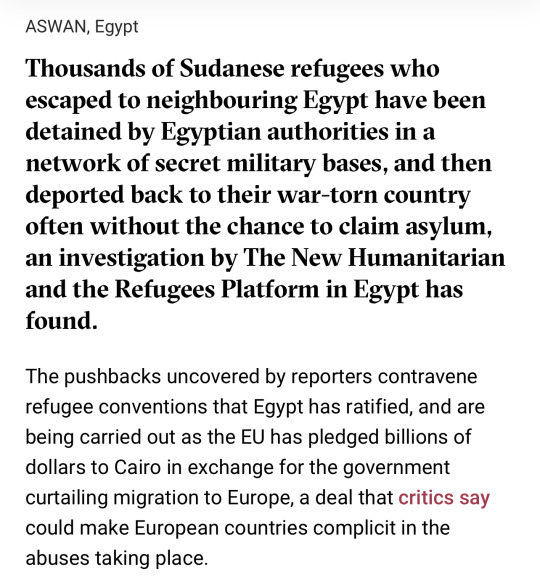
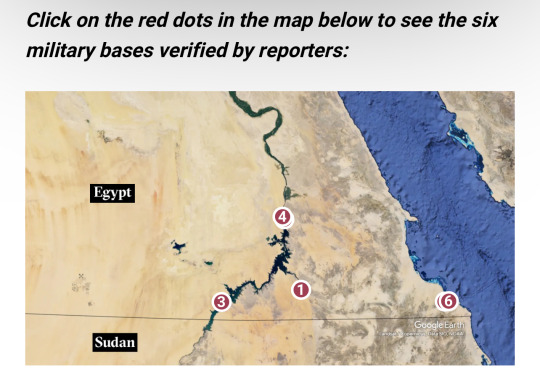
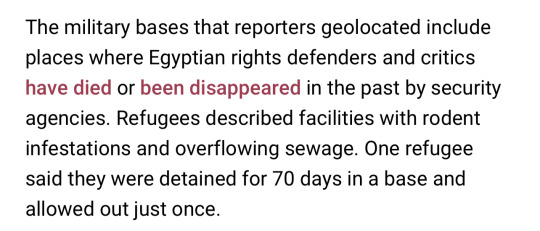
Of Note:
-When brought in front of prosecutors, Sudanese refugees are usually cleared of all wrongdoing but deported anyway (sham proceedings)
-The Egyptian military is involved in high-speed chases with refugees near the border that it is misreporting as civilian accidents— Sudanese individuals have been involved in “accidents” that have injured 160 and killed 20 since the Sudan war began. These accidents all happened on rural roads often utilized by refugees entering Egypt, some of whom have reported the military chasing them down by car, firing at them, and torturing their drivers
-An EU fund to keep African refugees out of Europe is helping fund this— the EU funds many North African regimes with human rights abuse records in exchange for their cooperation in keeping African migrants out of Europe. This isn’t the first time this specific fund has aided human rights abuses in the region— the Sudanese military has also used this same EU funding to help arm it during a period of time when it was disappearing and massacring its own citizens during peaceful pro-democracy sit-ins
#Egypt#sudan#refugees#EU#European union#north africa#middle east#horn of africa#east africa#Democracy
6 notes
·
View notes
Text
By Hebh Jamal. Nov 9, 2023
It is no secret Germany has taken a vehement pro-Israel stance with unconditional support for their genocide against the Palestinians in Gaza. However, their weaponization of antisemitism against migrant communities has presented itself as vehemently authoritarian, anti-democratic, and just plain racist.
So here’s a list just so you know. Each bullet point can have its own dissertation written on it.
Ban the pro-Palestinian organization Samidoun in Germany
Ban pro- Palestinian or anti-Israel protests across the country, leading to many instances of police violence, brutality and racial profiling
Ban keffiyehs, colors of the Palestinian flag, or stickers that say “Free Palestine” in Berlin primary and secondary schools. If violated, the teacher holds the right to call the police.
CDU Leader, Freidrich Merz says: “If there are refugees from Gaza then these are initially an issue for the neighboring countries. Germany cannot absorb any more refugees. We have enough antisemitic young men in the country.”
German President Steinmeier calls for Arab communities to condemn antisemitism
FDP Vice President Kubicki calls for an upper limit for migrants in city districts
“A quarter of the city must not have more than 25 percent migrants, so that no parallel societies emerge. What we see on German streets today is the result of parallel societies that developed because people came together in certain neighborhoods.”
“we can already legally deport people to third countries that are willing to accept them, and i would recommend that the federal government not only talk to countries of origin, but also to African countries, for example of which we know that theyd be willing to take people for a small fee. And we could do that today.”
Olaf Scholz vowing to “deport people on a large scale”
Then he does it. German government passed a “historic cross party deal” to clamp down on immigration and will “explore setting up asylum processing centres outside the EU”
it will open migrant centres in Albania
scales back social benefits for refugees, increases federal financial support for state governments and sets ambitious targets to speed up deportations
CDU General Secretary Carsten Linnemann says Scholz’s plan is not enough
“Asylum seekers should only be distributed among the municipalities if there is a right to remain. In addition, family reunification should be restricted and asylum procedures should be carried out in third countries.”
CDU General Linnemann calls for migrant quotas in schools
“35 percent - in the opinion of CDU General Secretary Linnemann, there should not be more migrants in German schools. He can also imagine a quota for residential areas.”
Linnemann advocated the introduction of compulsory preschool education followed by a language test . “I would only enroll young people who really know the German language.”
“Liberal” politician calls for stripping of German citizenship for people who he believes is “antisemitic.” He also urges that an antisemitism test be present in German naturalisation applications.
Give Israel an extra 300 million euros to continue their genocide of Palestinians
ARD tells its journalists how to talk about dead Palestinians - you guessed it, only in the context of its Hamas’ fault.
Berlin Senate is trying to strip funding from a cultural center in Berlin, Oyoun, because it gave space to anti-Zionist Jews.
I can go on and on and on, but it seems gravely more clear that Germany is utilizing the war on Gaza to carry out their right wing authoritarian fantasies. We can see and expect more to come.
#death to germany#stomach turning the way they talk about palestinians and migrants and refugees in general#germany#palestine#hebh jamal
13 notes
·
View notes
Text
People with guns and grenades; protests and riots all over France; and the beautiful city of Paris is burning.
The suicide of Europe continues.
The only consolation is that countries of the Global South are not adding fuel to this fire. Imagine if Syria, Iran, Russia, China, Latin America etc. funded and armed these "freedom fighters" like the West did/does all over the world.
youtube
The US is very good at assimilation of immigrants. Europe? Sucks at it.
Europe is in big trouble because it kept accepting migrants and refugees from all the countries that the US bombs or Europe exploits.
But these migrants never become a part of the European society.
In the US, there are strong laws on discrimination. Also, the U.S. is good at promoting talented black and brown people.
On the other hand, look at the parliaments or corporations or media in Europe. It’s pretty much 100% white.
Either don’t accept new people… or accept them and treat them as equals.
Germany, France, Spain, Italy, Sweden and many more in EU are all ticking time bombs, thanks to divided societies.

Macron is using heavily armed tactical units and armored vehicles against civilian protesters. What kind of democratic country would do this? France has become a fascist police state under dictator Macron.


The French riots have spread to Belgium’s capital city of Brussels. 64 individuals have already been arrested.
23 notes
·
View notes
Text
i got mail... what could it be.. oh its propaganda from mr orbán himself .. paid with my taxes? .. they really shoulnd't have...
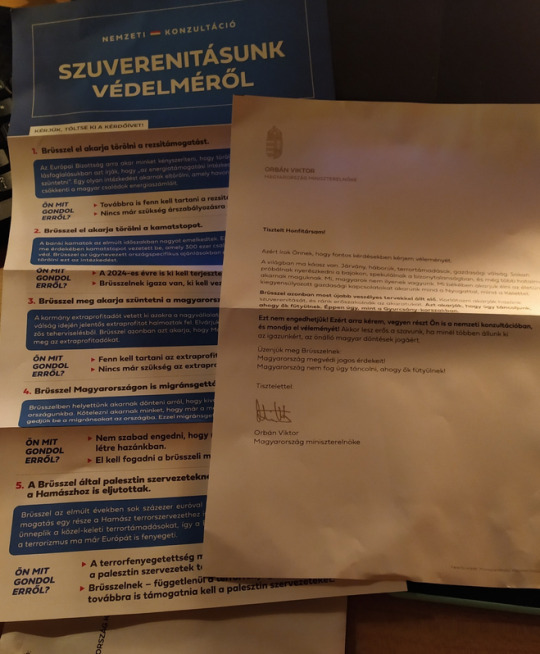
"Brussels is funding hamas" "gyurcsány" "ukraine bad" "brussels bad" (x10) "migrants" "we must protect our children from the gays" "ukraine is at war thats why we shouldt let them join the eu and also because our eu funds will go to them" "ukranian GMO grains are forced on us" "brussels is FORCING us to CHANGE our way of life they are DESTROYING us"
oh my fucking god
#'brussels is funding hamas' 😭 bro..#btw. its illegal to do even centrist peace protests about the palestinian genocide here#they straight up banned every protest that would show any kind of solidarity with palestinians#'we dont condone ukraine fighting (back) we want peace uwu' then they voted no on the palestinian ceasefire#i fucking hate this country bro. get me out of here#azért a lófasznak is van vége. kurva anyjukat.#they make these '''surveys''' '''asking for your opinion'''' like every year and spend a bunch of money on it#the questions are usually structured like 'Brussels is forcing us to accept aggressive LGBT propaganda being shown to our children. we have#to fight back. do you agree?' 'yes i agree we shouldnt let brussels force being gay on our children' 'i think they should force this on us'
9 notes
·
View notes
Text
European leaders and Tunisia’s president announced progress on Sunday in the building of hoped-for closer economic and trade relations and on measures to combat the often lethal smuggling of migrants across the Mediterranean Sea.[...]
Saied, speaking through a interpreter, said that he expects the memorandum to be followed by “a set of binding agreements” — suggesting more negotiating work ahead.[...]
Specific aid that von der Leyen announced included a 10-million euro ($11 million) program to boost exchanges of students and 65 million euros ($73 million) in EU funding to modernize Tunisian schools.
On migration, Von der Leyen said: “We need an effective cooperation more than ever.”[...]
Tunisia has faced an international outcry over the plight of hundreds of migrants who were deported to inhospitable desert areas on the Libya and Algeria borders. On the Tunisia-Algeria border, local reports have said as many as 30 migrants died.[...]
“The Tunisian people have provided these migrants with everything possible, with unlimited generosity, while many organizations, supposed to play their humanitarian role, only manifested themselves in press releases,” [Saied countered]
17 Jul 23
18 notes
·
View notes
Text
Russia-Ukraine Daily Briefing
🇷🇺 🇺🇦 Friday Briefing:
- White House intensifying efforts to confiscate Russian assets
- Rush of new defense deals with US shows Europe’s growing concern over Russia
- White House says readying new proposal to Russia to free two Americans
- Uzbekistan summons Russian ambassador after Prilepin suggests annexing ‘territories where migrants come from’
- Orban vows to stand firm against EU funding for Ukraine
- Supply from Russia’s Arctic LNG 2 project halted by US sanctions
- Russia battles to curb inflation ahead of Putin’s re-election bid
- Record number of treason cases heard in Russian courts this year
- Russia lists around 30 state companies for possible privatisation
- Central Asian cotton powers Russia’s sanctioned gunpowder plants
-----------------------------
📨 More in a daily newsletter: https://russia-ukraine-newsletter.beehiiv.com/
💬 My socials: https://linktr.ee/rvps2001

#russia ukraine war#ukraine russia war#ukraine war#russian army#russian war crimes#news#newsletter#russia#ukraine
3 notes
·
View notes
Text
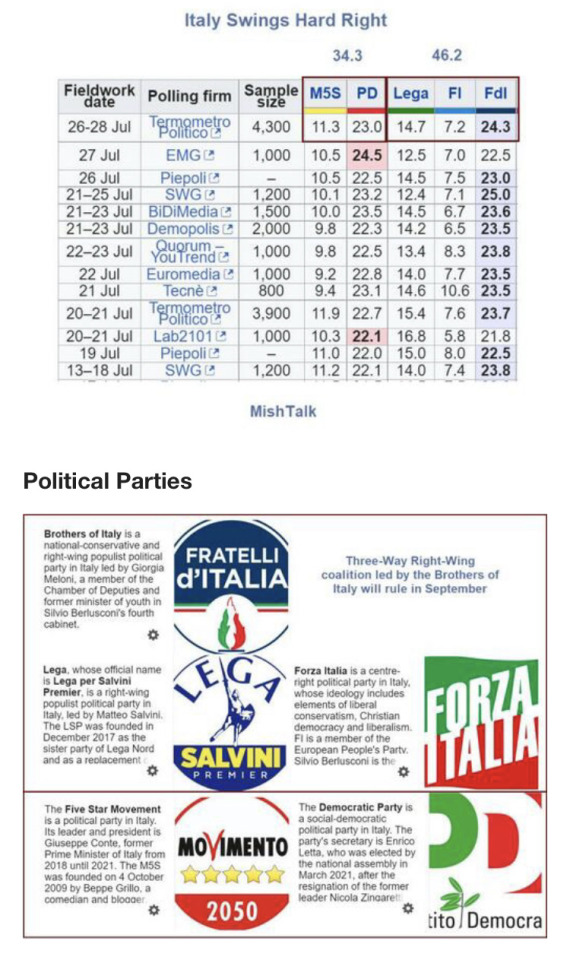
Italy about to Italiaexit the EU.
We can only speculate about the nature of the game being played by the forces of central banking and global technocratic governance, but they’ve slammed their foot on the gas pedal over the last 15 years and accelerated their agenda with speed that risks destabilization, war and the collapse of their post-WWII project.
These hard swings in European politics are easily predictable and have ample historical precedent. The insane pan-European immigration policy that started as a humanitarian plea for “refugees” devolved into an insidious and then rhetorically indefensible operation stressing the political stability of the target nations.
I’ve always suspected, like many have, that the “migrant crisis” isn’t an accident and that the absorption of human capital into Europe serves multiple purposes for the ruling class.
These agenda items include the erosion of national and cultural identity to destroy the political will of the nation state and provide conformity in the EU, and to prop up the famed cradle to grave welfare state of the European bloc that requires young tax mules to fund in an era of supposed population decline.
The powers that be erroneously imagined the migrant crisis would provide them a binding social stressor that would permit governments to coalesce additional powers in themselves.
Yet we are seeing these brush fires ignite which they’re having to repeatedly fight and a currency that’s in crisis. Add in the German energy crisis, Russia/Ukraine and an American political landscape that’s in wild transition and it’s quite a tinderbox.
58 notes
·
View notes
Text
Chancellor Olaf Scholz spoke of a "historic moment" after his federal government and the premiers of the 16 states agreed on a series of measures to amend Germany's refugee policy.
Benefits for refugees are more generous in Germany than in many other EU countries. Conservative politicians have described this as a "pull factor" attracting refugees to Germany, and have suggested paying out less or no more cash to new arrivals.
Currently, it takes an average of six to 18 months for an asylum application to be processed. Until now, applicants would receive higher benefits after they had been in the country for 18 months. That threshold will now be extended to 36 months. Until then, the reduced rate of €410 (about $440) per month will apply. Benefits such as food in state accommodation are offset.
After the announcement of the changes, Finance Minister Christian Lindner (FDP) wrote on X, formerly Twitter, that this could lead to savings of €1 billion. This would "not only relieve the burden on states and municipalities," he wrote, it would also "reduce the appeal of the German welfare state."
Payment cards instead of cash
Currently, adults living in initial reception facilities receive food at their accommodation, and an additional maximum of €150 (about $160) per month in pocket money for personal needs such as phone cards, toiletries or travel tickets. This "pocket money" is enshrined in law, and the constitutional court has ruled that it cannot be arbitrarily reduced.
A special working group will now map out ways to switch to payment cards instead of cash payments from early 2024.
Such debit cards are being used in other countries, such as France. Instead of being given cash, refugees would receive a card, to which social authorities would regularly transfer the allowances which can be used to pay for purchases in supermarkets. However, it's not possible to withdraw cash from the card.
It has long been legally possible to provide refugees primarily with benefits in kind, but the states and local authorities prefer not to because it requires more resources and turns out to be much more expensive than simply paying out cash.
"The principle of benefits in kind was already tried in the 1990s, and then again in 2015 and it turned out not to be practical," said Niklas Hader of the German Center for Integration and Migration Research in Berlin.
It will now also be made easier for asylum-seekers to take up charitable work while they are waiting for their applications to be approved.
Border controls to remain
The stationary controls introduced in October at the borders with Poland, the Czech Republic and Switzerland will be maintained "for a long time," according to Chancellor Scholz.
Refugees who want to enter Germany from other EU countries should be sent back to those countries directly, if possible. It is therefore planned to carry out checks before refugees reach the German border. This is already the case in Poland.
Asylum procedures set to speed up
Asylum procedures are to be accelerated; the aim is to limit the duration to six months, including appeals in court. The EU-led countries in particular would like asylum procedures to take place outside of Europe, for example in Africa.
This option is to be examined, but there are considerable legal concerns and doubts about its feasibility. Bavaria's state premier, Markus Söder, of the center-right CSU, said after the meeting between the federal and state governments that he felt things were moving in the right direction, but it was still not enough.
"We have to keep up the pressure to limit immigration to Germany," he said.
More federal funds
To date, the states have had to renegotiate with the federal government every year about who pays what costs for the care of refugees. Now, there is to be a lump sum of €7,500 per refugee per year.
So far in 2023, some 220,000 migrants have made an initial application for asylum. And of the 1 million Ukrainian refugees from the war, more and more are now registering with the authorities to be housed by the state.
Cities and municipalities have long been asking for support with accommodation, ranging from a simplification of legal procedures to an increase in social housing programs.
'Not much to be gained' from tougher deportation rules
At the moment, there are around 250,000 people in Germany who have had their asylum applications rejected. Some people simply cannot be tracked down by authorities. But 200,000 of them can't be repatriated as there is either no country willing to take them in, or their country of origin is a war zone or they themselves have serious health issues that cannot be treated in their countries of origin.
In late October, the government drafted a bill to increase the number of deportations. However, the high number of refugees in most cities and municipalities currently consists of new arrivals.
Across Germany, mayors and district councils are saying they no longer know where to accommodate the refugees who are allocated to them according to a fixed distribution formula.
In October, 600 of Germany's 11,000 municipalities took part in a survey conducted by Mediendienst Integration together with migration researchers from the University of Hildesheim. Almost 60% of them described the situation as "challenging, but [still] feasible." But 40% percent report being "overloaded" or even said they were "in emergency mode."
The lack of accommodation is just one factor. There's also a shortage of administrative staff, and not enough spots in nurseries and schools, language courses and counseling services for traumatized refugees.
4 notes
·
View notes
Text
A year and a half after winning a landslide victory in the parliamentary election, Hungary’s ruling Fidesz party has launched another “national consultation”, ostensibly as a way to protect the country’s national sovereignty but which observers believe is more designed to shore up its eroding voter base.
This will be its 12th such consultation since the government won power in 2010, all of them criticized by opposition parties and professional pollsters as propaganda tools that are manipulative and biased in their wording to get the answers the government wants. Indeed, this one centres on the theme of sovereignty, which has recently become a key term for the populist-nationalist government’s narrative in its fight against the EU and will be a leading theme in the campaign for the June 2024 European Parliament elections.
All 11 questions of the national consultation are formulated in a way that makes strong accusations against “Brussels” or the EU, which Hungary has been a member of for almost 20 years. The questions are binary, allowing only “yes” and “no” answers.
For example, one question is: “Brussels wants to establish migrant ghettos in Hungary. Do you think that we should not allow migrant ghettos to be established in Hungary or the migration plans from Brussels should be accepted?”
Another question notes that some of the EU’s financial support to Palestinians is syphoned off by Hamas and asks citizens whether Brussels should end funding to Palestinians or – despite terror threats – continue financing them.
Four questions are dedicated to Ukraine, asking citizens whether they agree with Ukraine’s EU membership (the EU has only just decided to open enlargement negotiations with Kyiv), whether more weapons and money should be sent to the country at war, and whether Hungary should allow the import of “genetically modified” Ukrainian grain. Most of these questions are a safe bet for the government, as polls show a majority of Hungarians hold critical views of Ukraine as a result of years of anti-Ukrainian propaganda.
The results of the questionnaire are non-binding, but are designed to give Fidesz some “popular backing” in its negotiations with the European Commission and the Council of the EU.
Zoltan Novak of Meltanyossag Intezet (Centre for Fair Political Analysis), a Budapest-based think tank, told critical news site Nepszava that Orban wanted to rally his “hard-core” support and stop these voters from drifting away from the party. Fidesz has lost 600,000 to 800,000 voters since last year’s election, though opposition parties have largely failed to capitalise on the loss.
Novak admits that Fidesz has identified the core issues for Hungarian voters ahead of next year’s European elections and the national consultation could be seen as a warm-up to the campaign.
Samuel Agoston Mraz, head of the government-close Nezopont Institute, praised the governing party’s democratic commitment. “National consultations send a very strong message, they strengthen the democratic mandate when millions support the government’s position,” he told public radio.
Perhaps fearing a low turnout, Fidesz politicians are now embarking on a nationwide tour to promote the consultation and urge people to fill it out and return it by January 10.
Parallel to the national consultation, a billboard campaign has also been launched, depicting Alex Soros, son of Hungarian-born US billionaire George Soros and a hate-figure for the Orban government, and Ursula von der Leyen, president of the European Commission, alongside the slogan: “We won’t dance to their tune”.
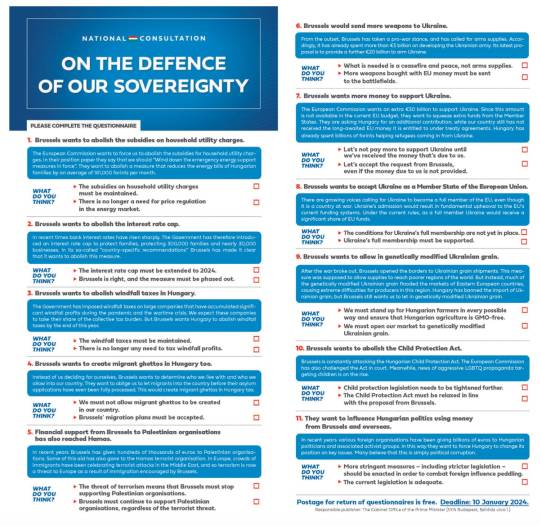
13 notes
·
View notes